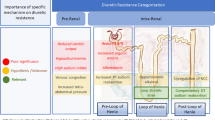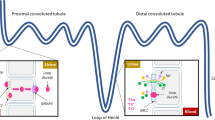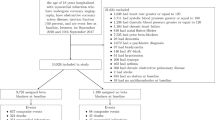Abstract
Background
In Germany, care for patients with chronic heart failure (HF) is provided by hospital-based cardiologists (HBC), office-based cardiologists (OBC) and general practitioners (GP). We aimed to compare patient characteristics, diagnostic approaches and therapeutic decisions.
Methods
Multi-centre, cross-sectional, observational survey at 48 physicians. Patients (n = 384) were required to have previously diagnosed HF and NYHA class ≥ II and/or a left ventricular ejection fraction of <50 %. A total of 384 patients were included at 5 HBCs, 26 OBCs and 18 GPs.
Results
A mean of 18.8 % of all patients at HBCs practices had heart failure, compared to a smaller proportion of 13.9 and 6.7 % at OBCs and GPs, respectively. Echo facility was available for all HBCs and OBCs, but for 16.7 % of GPs (p < 0.0001 for trend). Patients at HBCs had a higher NYHA class (65.6 % had class III/IV; p < 0.0001) compared to 36.8 % at OBCs and 39.3 % at GPs. Usage of three guideline-recommended pharmaceutical treatments was more than 80 %: diuretics (83.1 %), renin–angiotensin system blocking agents (91.4 %) and betablockers (90.1 %) with no differences between physician groups. Mineralocorticoid receptor antagonists (MRAs, overall 47.7 %) were more frequently prescribed by OBCs (54.7 %; p = 0.0007 for trend) than HBCs (43.8 %) and GPs (31.0 %). Ivabradin was not frequently used (11.0 % at OBCs, 4.9 % at HBCs and 0 % at GPs; p = 0.0163 for trend). The proportion of patients with CRT (8.6 %), ICD (23.5 %) and CABG (23.1 %) was not statistically different between groups.
Conclusion
REFLECT-HF demonstrates that there are some differences in evidence-based treatment decisions between the three main health services (HBC, OBC and GP) providing care for patients with HF in Germany. Advocating adherence to guideline recommendations and earlier adoption of these evidence-based treatments across all levels of care might further improve patient care.

Similar content being viewed by others
References
Mehrhof F, Loffler M, Gelbrich G, Ozcelik C, Posch M, Hense HW, Keil U, Scheffold T et al (2010) A network against failing hearts—introducing the German “Competence Network Heart Failure”. Int J Cardiol 145:135–138
Braun V, Heintze C, Rufer V, Welke J, Stein T, Mehrhof F, Dini L (2011) Innovative strategy for implementing chronic heart failure guidelines among family physicians in different healthcare settings in Berlin. Eur J Heart Fail 13:93–99
Dini L, Heintze C, Welke J, Stein T, Rufer V, Braun V (2010) Are there any differences in guideline adherence to pharmacotherapy of heart failure between individual GP practices and Medical Care Centres (MCCs)? Z Evid Fortbild Qual Gesundhwes 104:113–119
Baumhakel M, Muller U, Bohm M (2009) Influence of gender of physicians and patients on guideline-recommended treatment of chronic heart failure in a cross-sectional study. Eur J Heart Fail 11:299–303
Kasje WN, Denig P, De Graeff PA, Haaijer-Ruskamp FM (2004) Physicians’ views on joint treatment guidelines for primary and secondary care. Int J Qual Health Care 16:229–236
Rutten FH, Grobbee DE, Hoes AW (2003) Differences between general practitioners and cardiologists in diagnosis and management of heart failure: a survey in every-day practice. Eur J Heart Fail 5:337–344
Mair FS, Crowley TS, Bundred PE (1996) Prevalence, aetiology and management of heart failure in general practice. Br J Gen Pract 46:77–79
Hood S, Taylor S, Roeves A, Crook AM, Tlusty P, Cohen J, Kaddoura S, Hemingway H (2000) Are there age and sex differences in the investigation and treatment of heart failure? A population-based study. Br J Gen Pract 50:559–563
Zugck C, Franke J, Gelbrich G, Frankenstein L, Scheffold T, Pankuweit S, Duengen HD, Regitz-Zagrosek V et al (2012) Implementation of pharmacotherapy guidelines in heart failure: experience from the German Competence Network Heart Failure. Clin Res Cardiol 101:263–272
Franke J, Zugck C, Wolter JS, Frankenstein L, Hochadel M, Ehlermann P, Winkler R, Nelles M et al (2012) A decade of developments in chronic heart failure treatment: a comparison of therapy and outcome in a secondary and tertiary hospital setting. Clin Res Cardiol 101:1–10
McMurray JJ, Adamopoulos S, Anker SD, Auricchio A, Bohm M, Dickstein K, Falk V, Filippatos G et al (2012) ESC Guidelines for the diagnosis and treatment of acute and chronic heart failure 2012: The task force for the diagnosis and treatment of acute and chronic heart failure 2012 of the European Society of Cardiology. Developed in collaboration with the Heart Failure Association (HFA) of the ESC. Eur Heart J 33:1787–1847
Bundesärztekammer (BÄK), Kassenärztliche Bundesvereinigung (KBV), Arbeitsgemeinschaft der Wissenschaftlichen Medizinischen Fachgesellschaften (AWMF) (2009) National guideline chronic heart failure—Long version. http://www.versorgungsleitlinien.de/themen/herzinsuffizienz/pdf/nvl_hi_lang.pdf
DEGAM. Guideline No. 9: heart failure. http://leitlinien.degam.de/uploads/media/Langfassung_Herzinsuffizienz_1_E002BIndex.pdf
Ehlers APF, Götting S (2007) The accountability requirements of section 13550 of the cardiocomplex EBM. http://www.bnk.de/uploads/media/0703_262.pdf
Kassenärztliche Bundesvereinigung (2013) Physician group EBM. http://www.kbv.de/8170.html
Schowalter M, Gelbrich G, Stork S, Langguth JP, Morbach C, Ertl G, Faller H, Angermann CE (2013) Generic and disease-specific health-related quality of life in patients with chronic systolic heart failure: impact of depression. Clin Res Cardiol 102:269–278
Quittan M, Wiesinger GF, Crevenna R, Nuhr MJ, Posch M, Hulsmann M, Muller D, Pacher R et al (2001) Cross-cultural adaptation of the Minnesota living with heart failure questionnaire for German-speaking patients. J Rehabil Med 33:182–186
Rutten FH, Grobbee DE, Hoes AW (2003) Diagnosis and management of heart failure: a questionnaire among general practitioners and cardiologists. Eur J Heart Fail 5:345–348
Mason J, Young P, Freemantle N, Hobbs R (2000) Safety and costs of initiating angiotensin converting enzyme inhibitors for heart failure in primary care: analysis of individual patient data from studies of left ventricular dysfunction. BMJ 321:1113–1116
Clarke KW, Gray D, Hampton JR (1994) Evidence of inadequate investigation and treatment of patients with heart failure. Br Heart J 71:584–587
Remes J, Miettinen H, Reunanen A, Pyorala K (1991) Validity of clinical diagnosis of heart failure in primary health care. Eur Heart J 12:315–321
Cleland JG, Cohen-Solal A, Aguilar JC, Dietz R, Eastaugh J, Follath F, Freemantle N, Gavazzi A et al (2002) Management of heart failure in primary care (the IMPROVEMENT of heart failure programme): an international survey. Lancet 360:1631–1639
Jaarsma T, Haaijer-Ruskamp FM, Sturm H, Van Veldhuisen DJ (2005) Management of heart failure in The Netherlands. Eur J Heart Fail 7:371–375
Zannad F, McMurray JJ, Krum H, van Veldhuisen DJ, Swedberg K, Shi H, Vincent J, Pocock SJ et al (2011) Eplerenone in patients with systolic heart failure and mild symptoms. N Engl J Med 364:11–21
Franke J, Wolter JS, Meme L, Keppler J, Tschierschke R, Katus HA, Zugck C (2013) Optimization of pharmacotherapy in chronic heart failure: is heart rate adequately addressed? Clin Res Cardiol 102:23–31
Bohm M, Borer J, Ford I, Gonzalez-Juanatey JR, Komajda M, Lopez-Sendon J, Reil JC, Swedberg K et al (2013) Heart rate at baseline influences the effect of ivabradine on cardiovascular outcomes in chronic heart failure: analysis from the SHIFT study. Clin Res Cardiol 102:11–22
Reil JC, Custodis F, Swedberg K, Komajda M, Borer JS, Ford I, Tavazzi L, Laufs U et al (2011) Heart rate reduction in cardiovascular disease and therapy. Clin Res Cardiol 100:11–19
Houghton AR, Cowley AJ (1997) Why are angiotensin converting enzyme inhibitors underutilised in the treatment of heart failure by general practitioners? Int J Cardiol 59:7–10
Ahmed A, Centor RM, Weaver MT, Perry GJ (2005) A propensity score analysis of the impact of angiotensin-converting enzyme inhibitors on long-term survival of older adults with heart failure and perceived contraindications. Am Heart J 149:737–743
Ahmed A, Kiefe CI, Allman RM, Sims RV, DeLong JF (2002) Survival benefits of angiotensin-converting enzyme inhibitors in older heart failure patients with perceived contraindications. J Am Geriatr Soc 50:1659–1666
Jost A, Rauch B, Hochadel M, Winkler R, Schneider S, Jacobs M, Kilkowski C, Kilkowski A et al (2005) Beta-blocker treatment of chronic systolic heart failure improves prognosis even in patients meeting one or more exclusion criteria of the MERIT-HF study. Eur Heart J 26:2689–2697
Deedwania PC, Gottlieb S, Ghali JK, Waagstein F, Wikstrand JC, Group M-HS (2004) Efficacy, safety and tolerability of beta-adrenergic blockade with metoprolol CR/XL in elderly patients with heart failure. Eur Heart J 25:1300–1309
Bosch M, Wensing M, Bakx JC, van der Weijden T, Hoes AW, Grol RP (2010) Current treatment of chronic heart failure in primary care; still room for improvement. J Eval Clin Pract 16:644–650
Schuchert A, Muto C, Maounis T, Frank R, Ella RO, Polauck A, Padeletti L, Mascot Study G (2013) One-year outcome after CRT implantation in NYHA class IV in comparison to NYHA class III patients. Clin Res Cardiol 102:505–511
Pitt B, Remme W, Zannad F, Neaton J, Martinez F, Roniker B, Bittman R, Hurley S et al (2003) Eplerenone, a selective aldosterone blocker, in patients with left ventricular dysfunction after myocardial infarction. N Engl J Med 348:1309–1321
Pitt B, Zannad F, Remme WJ, Cody R, Castaigne A, Perez A, Palensky J, Wittes J (1999) The effect of spironolactone on morbidity and mortality in patients with severe heart failure. Randomized Aldactone Evaluation Study Investigators. N Engl J Med 341:709–717
Gysan DB, Albus C, Riedel R, Hossmann V, Vogt A, Latz V, Griebenow R (2012) CorBene: a new model for collaborative care of patients with congestive heart failure. Herz 37:56–58
Acknowledgments
The statistical evaluation by Michael Obermayer (GKM Gesellschaft für Therapieforschung mbH, München) is acknowledged. This study was sponsored by Pfizer.
Conflict of interest
Michael Böhm, Carsten Tschöpe, Ulrich Tebbe, Jost Henner Wirtz, Jan Lokies and Peter Bramlage have received research funding from a number of pharmaceutical companies interested in heart failure including the sponsor of the present study Pfizer Pharma GmbH, Berlin. Peter Bramlage was a paid consultant to Pfizer in connection with the development of this manuscript. Eva Turgonyi, Anke M. Strunz and Katharina Lins are employees of the sponsor.
Author information
Authors and Affiliations
Corresponding author
Appendix
Appendix
Steering Committee
Michael Böhm (Homburg/Saar), Carsten Tschöpe (Berlin), Ulrich Tebbe (Detmold), Jost Henner Wirtz (Dinslaken), Jan Lokies (Berlin), Peter Bramlage (Mahlow).
Investigators
Ulrich Tebbe (Detmold), Stefan Blankenberg (Hamburg), Stefan Störk (Würzburg), Bernd-Dieter Gonska (Karlsruhe), Günter Piske (Berlin), Gunter Stenzel (Riesa), Clemens Bauknecht (Rottweil), Heribert Brück (Erkelenz), Peter Bosiljanoff (München), Jens Taggeselle (Markkleeberg), Gunter Seidel (Detmold), Sinisa Miketic (Detmold), Torsten Figura (Rinteln), Susanne Backhaus (Buchholz), Dag-Alexander Keilhau (Hamburg), Jens Beermann (Wedel), Behrus Subin (Hamburg), Wilhelm Josef Mieseler (Höchberg), Claus Günthert (Höchberg), Michael Dobler (Karlstadt), Heinrich Bechtold (Schrozberg), Matthias Salefsky (Aschaffenburg), Ulrich Staedt (Speyer), Thomas Dieterle (Ettlingen), Sabine Raulin (Karlsruhe), Mustafa Durak (Heidelberg), Petra Lange-Braun (Berlin), Andreas Förster (Berlin), Rene Oliver (Berlin), Claudia Zemmrich (Berlin), Werner Rieker (Berlin), Heike Stenzel (Riesa), Peter Kindermann (Riesa), Jan Nimetschik (Gröditz), Petra Bauer (Bad Liebenwerda), Andreas Hagenow (Elsterwerda), Ottmar Banning (Waldmössing), Klaus Götz (Bad Dürrheim), Johannes Guhl (Villingen-Schwenningen), Karl Stuff (Donaueschingen), Helmut Hermanns (Erkelenz), Franz-Josef Geffers (Erkelenz), Ulrich Arendt (Mönchengladbach), Alexandra Haupt-Pichler (München), Cornelia Groos-März (München), Constanze Schmidt (Borna), Thomas Theuner (Markkleeberg), Astrid Meier (Markkleeberg), Cornelia Schlott (Zwenkau).
Rights and permissions
About this article
Cite this article
Tebbe, U., Tschöpe, C., Wirtz, J.H. et al. Registry in Germany focusing on level-specific and evidence-based decision finding in the treatment of heart failure: REFLECT-HF. Clin Res Cardiol 103, 665–673 (2014). https://doi.org/10.1007/s00392-014-0678-2
Received:
Accepted:
Published:
Issue Date:
DOI: https://doi.org/10.1007/s00392-014-0678-2




